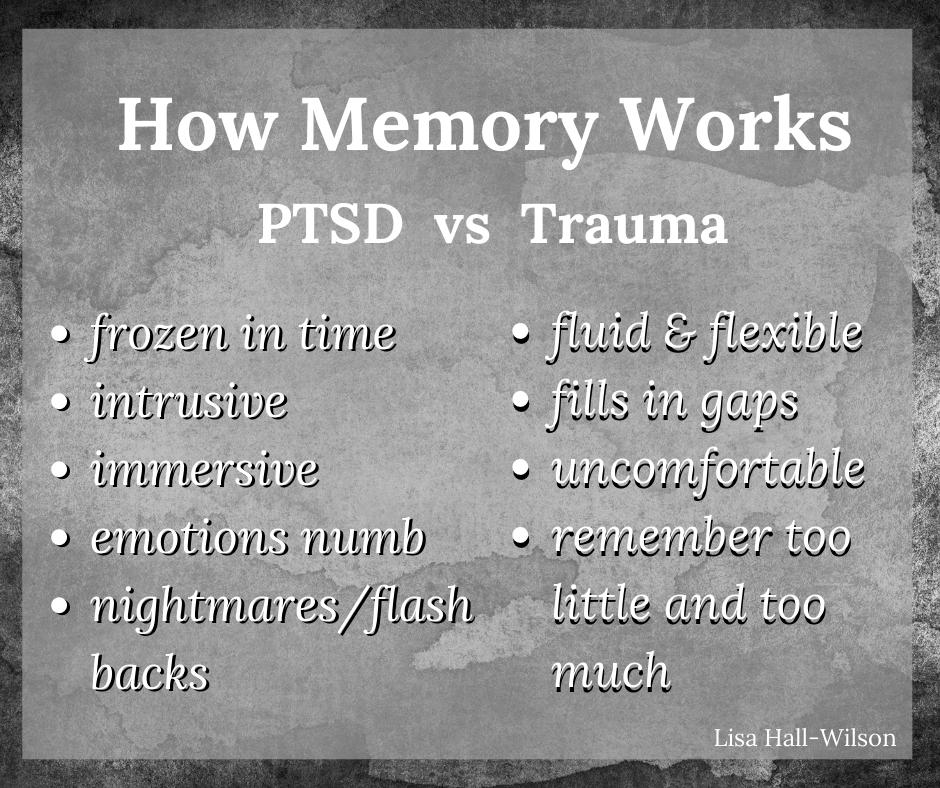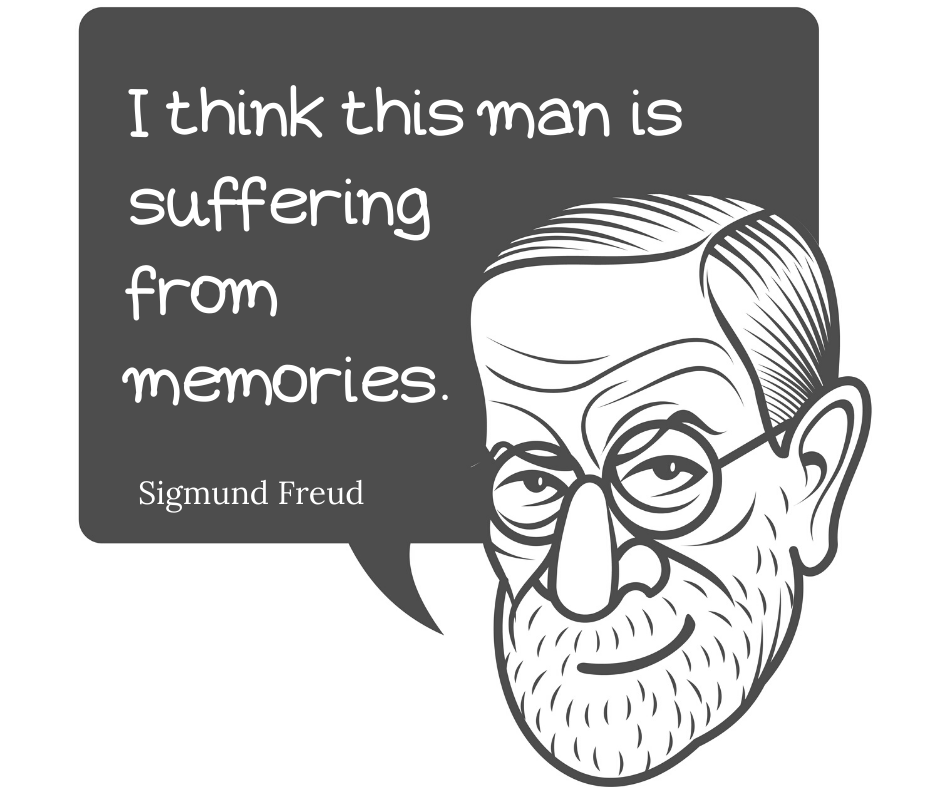
PTSD and trauma (both big “T” and small “t” trauma), affect our memory in different ways, and when writing in deep point of view, it becomes telling to label an emotion for readers. So, how do we write trauma memories realistically without overwhelming readers with gratuitous details and melodrama?
PTSD (post traumatic stress disorder) and trauma, either as current events or historical, are compelling elements in fiction. An essential tool then becomes backstory, memories, and flashbacks to show character arc and internal (and external) conflict.
Big “T” Trauma vs Small “t” Trauma
Trauma is a response to any event that overwhelms our ability to cope, causes feelings of helplessness and diminishes our ability to feel a full range of emotions. Keep that in mind, because anything can be traumatic depending on the individual and what they can cope with.
Big “T” trauma events cause an individual to feel they’re in mortal danger. Small “t” trauma events (a divorce for instance) are overwhelming for a short time. When crafting characters, don’t think of trauma as only big “T” trauma events like natural disasters, hostage taking, kidnapping, murder, rape, war, etc. Small “t” trauma can be just as devastating, and moreso for individuals who endure repeated small “t” trauma. A series of “t” events that pile up (like being bullied) can be trauma by a thousand cuts.

How Big “T” Trauma Affects The Brain
Small “t” trauma, because it lacks the life-threatening component, may be captured differently in memory. The character might remember what they were thinking for instance, where they were, what else they were doing that day. When asked to recall a traumatic event, brain imaging scans show that some parts of the brain light up and others go quiet. To oversimplify things, the part of the brain focused on survival is prioritized and the parts of the brain focused on communication, analytical thinking, etc. are slowed or at the least not prioritized.
People may react first without really thinking about their actions when when fight, flight or freeze is triggered. I walked five miles for help, but don’t remember walking. The ground crunched when I walked, every step on broken glass, but I couldn’t think of why it the ground would sound like that (see account below). The part of the brain that labels things, that rationalizes or understands the WHY behind the things we do, shuts down. Of course there are accounts where some were able to maintain a presence of mind and think their way out of a problem, but their ability to do that in life-threatening circumstances is remarkable.
With PTSD, once the trauma memories are triggered (with or without flashbacks), the ability to remember and learn is diminished. I’ve sat through countless martial arts classes, but if I’m triggered while I’m there, I won’t remember anything that was taught. Nada. My brain is too focused on finding and protecting me from threat. I’ll be a yellow belt FOREVER lol.
Focus on particular details, specific sensory details, that you want readers to tune in to, that will create that immersive visceral effect you’re looking for. Rather than trying to capture everything.
How Age Affects Trauma Memories
When big “T” trauma isn’t experienced until adulthood, likely the character will have support systems in place, already developed the coping mechanisms and neural connections that will help them respond and hopefully overcome whatever they’ve survived. Things a child might not have access to or developed yet.
This means the trauma memories will be different between children and adults. They may have different priorities, different things may be considered overwhelming. This will affect how they remember things, and which details the brain looks to other sources to fill in. Memory can return in bits and pieces over time.
The internal dialogue around a trauma memory will be different depending on how old the character was when the trauma occurred. One place I’ve seen this really illustrated is in accounts of the Holocaust, because there’s been a large effort to capture those memories in the words of those who lived them. Those survivors who were adults when it happened, they remembered different details in different ways than those who were children when it happened.

How Trauma Memory Works
A trauma memory isn’t recorded in continuous action like a film. It’s recorded in bits with skips and blanks. Writing a memory from a trauma experience that reads like a news report will overwhelm readers and isn’t how memory works at all.
Memory is flexible and fluid. With time some elements fade and others come to the fore. This is the problem with prosecuting rape in court, because a victim might retell the experience immediately following the event one way and then have a slightly different story (leave some details out or become unsure of small points, remember new details) six months later in court which then makes the memory and the victim seem unreliable by judges and juries.
Memory Seeks Context, Continuity, and Closure
Human brains crave beginnings, middles, and ends to things. Context. Continuity. Closure. So, what a victim remembers immediately after an incident, their brain may purposely forget because it’s overwhelming. Or, details they couldn’t handle initially or weren’t initially aware of may emerge as they’re able to deal with the trauma in time.
The Netflix series Unbelieveable, while incredibly hard to watch, does a good job of capturing the effects of memory on trauma over an assortment of characters.
Author Rene Gutteridge described her experience being in/near the Oklahoma City bombings.
“The building had a gaping hole. Cars and trees were on fire. Ash-covered people wondered aimlessly like zombies. Police, fire and ambulances came rushing to the scene.”
But Gutteridge admits that asking her to describe the event has her tapping into coverage she saw after the fact, not her own personal experience of it. Her brain needed context and continuity, so the news coverage fills in the gaps in her own memory. In deep pov, we don’t want the news coverage, we want the lived experience of the event. What was it like in the moment? She then shared her memory of her lived experience of the event:
“One of the most vivid things I recall is the crunch, crunch, crunch sound of glass as I ran to the south side of the building to get around the fires. I didn’t take a step that didn’t put glass under my feet, but at the time I couldn’t figure out what it was that I was running on…I remember all that paper floating down from the sky and the urge to gather it up because that’s what you do when people lose their important papers—you gather it up for them.
Hours after the bomb went off, sirens still took up all the silence…Did I see death? Blood and gore? The most desperate moments of my fellow human beings? I did. I had to have. There was no way for me to miss it. Yet I have one or two small, vivid images of that sort of thing.”
Do you see the difference?
Recap: Trauma memory is captured in bits and pieces with gaps and skips in time. Our brains will fill in the gaps because it seeks continuity, context, and closure. Details remembered may change over time. Big “T” trauma memory may not register why the character is acting a certain way or what they’re experiencing in the urgency to escape or survive. PTSD memory is covered in part two, but it is not like trauma memory but is frozen in time.
Are you using trauma memories in your stories?
Been told you should learn Deep Point Of View? Had an editor or critique partner tell you to “go deeper” with the emotions in your fiction? Looking for a community of writers seeking to create emotional connections with readers? Check out the Going Deeper With Emotions In Fiction Facebook group.
For the last year I’ve been forwarding your posts to the people in my writers critique group. All of us have been able to apply your deep pov exercises to our writing. Very helpful.
Could I ask where you live? We are down here in Florida, but I wonder if you are in the neighborhood.
I am not in your neighbourhood. <- does the spelling give you a clue? lol Thanks so much for the continued support and I'm so glad the blog has been helpful to you and your group! I'm in London, Ontario.
Thanks Lisa. Good to know difference between Big T and small t. Barb
I know the nuances seem small, trauma is trauma – but it does help us make the internal dialogue in particular and the sensory details more realistic. If we can capture these experiences with honesty, it does help raise awareness in the general public as well.
Brilliant, Lisa. This piece has resurrected some of my own lived-yet-buried memories. You’re right. Little pieces, like broken glass, are still coming together, even after forty years. I am only now understanding, through my dreams (nightmares), what really happened to me.
That’s so hard. Be kind to yourself. ((hugs)) I’ve learned how important it is to “shed emotions” as they resurface. Easier said than done.
Your email landed as an answered request today. Just this morning I began noodling over a chapter I am about to write that begins with one of my characters having just gone through a traumatic experience. I thought to myself I could use some help in how best to depict this in her deep POV and presto! Your extremely helpful email arrived. Thank you!
Awesome! There are a few resources here on my blog about writing trauma and PTSD in deep point of view.
Thank you so much for the informative post! It is exactly what I needed for my WIP! I do have a question. At the end you mention a part 2. I haven’t been able to find the 2nd part (or maybe I have and just don’t realize it!) Could you point me int he right direction?
Thank you again so much!
I haven’t gotten to part 2 yet, so this is a good kick in the pants to finish it. lol Glad you found it helpful. Will hopefully post #2 this week.
This is great advice. I’m writing the second book in my series, and the Big T event occurred in the first. The (first-person POV) MC is still trying to cope with the fallout and her PTSD, but I didn’t want to overwhelm the reader with details. Your post has given me some pointers on how to focus on one or two things that linger, rather than going through it all again. Thanks!